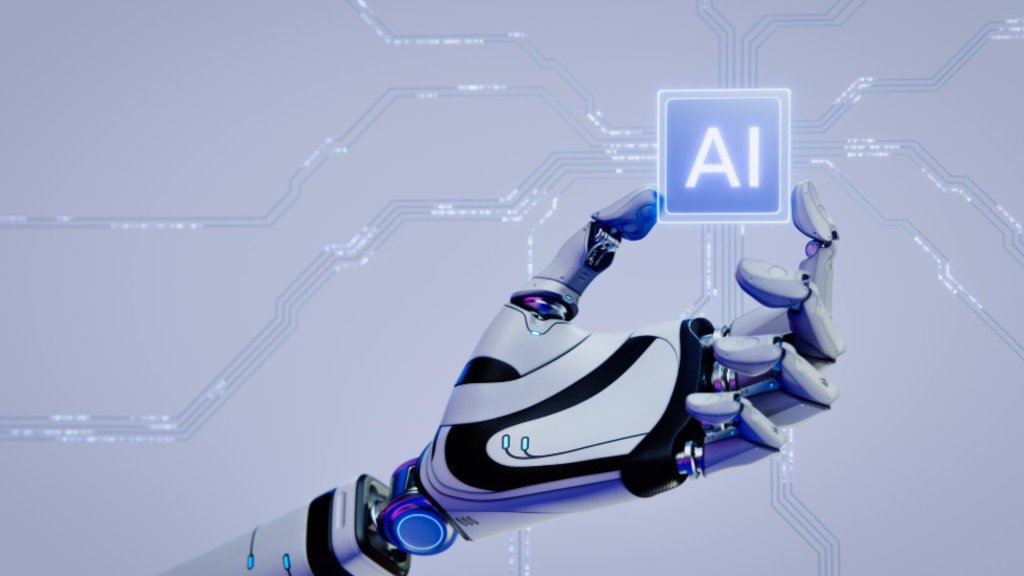Are you struggling to stick to a daily routine? Do those repetitive tasks suck the life and motivation out of you? If you learn how to use artificial intelligence, these issues can be effectively addressed. AI replaces tedious tasks with automated and efficient tasks.
Artificial intelligence can be considered a form of smart assistance. They can write, analyze data, and refine your creative ideas. AI can help a small business save thousands of dollars. Moreover, AI can help students complete their homework more efficiently.
Artificial Intelligence can help marketing teams generate copy in half the time you trust. AI can help healthcare professionals with more accurate diagnoses of patients.
This comprehensive guide offers practical insights into the successful application of artificial intelligence. You will find tools that are easy to use and will exceed your productivity expectations. Transform your work and personal life today.
The Fundamentals of Artificial Intelligence (AI)
AI imitates human reasoning in computer systems. Current AI applications successfully use these technologies to solve existing challenges. The more you grasp these concepts, the more you can decide which form of AI tool to utilize, if any.
Core AI Technologies Explained
Machine Learning (ML) algorithms enhance the performance of tasks by analyzing data. Natural Language Processing (NLP) enables computers to understand the authorial intent of text. Computer vision allows AI systems to comprehend images.
Deep Learning allows data scientists and AI experts to utilize the training of neural networks to perform tasks of increasing complexity. These are the technologies that power the AI tools you may be using.
| AI Technology | Primary Function | Common Applications |
| Machine Learning | Pattern Recognition | Email filtering, recommendations |
| Natural Language Processing | Text Understanding | Chatbots, translation services |
| Computer Vision | Image Analysis | Photo tagging, security systems |
| Deep Learning | Complex Problem Solving | Voice recognition, autonomous vehicles |
Types of AI Systems
Narrow AI focuses on specific tasks. General AI remains theoretical for future development. Generative AI creates new content from existing data. Predictive analytics anticipates future patterns and trends. Each type serves different business and personal needs.
Essential AI Tools for Beginners
To get started, you have to choose the right AI platforms. These tools will have interfaces that allow beginners to use them without difficulty, while also providing powerful options. Start with free tools and then progress to those that require a payment.
Content Creation and Writing Tools
ChatGPT revolutionizes the way people approach writing and research. Ask questions and get detailed, informative answers. Create blog posts, emails, and other content easily and quickly. AI-related chatbots such as Claude also provide research support.
Grammarly helps develop your writing quality and clarity automatically. Review grammar, spelling, and tone in your documents. Jasper AI specializes in marketing and assists businesses in creating compelling marketing content. Copy.ai generates social media posts and advertisements. These writing assistants integrate with popular applications seamlessly:
- Microsoft Word and Google Docs compatibility
- Browser extensions for email and social media
- Mobile apps for writing on the go
- Team collaboration features for businesses
Visual Content and Design AI
DALL-E creates stunning images from text descriptions. Midjourney produces artistic visuals for creative projects. These image generation tools spark innovation in design.
Canva AI makes it easy to create professional graphics. Adobe Firefly integrates with existing design workflows. Stable Diffusion offers free image generation options.
Productivity and Business Applications
Microsoft Copilot significantly enhances Office 365 productivity. Google Bard assists with research and analysis. Notion AI organizes notes and project management. AI tools streamline various business processes automatically:
- Calendar scheduling and meeting coordination
- Email response automation and filtering
- Data entry and spreadsheet management
- Customer service and support tickets
How to Use Artificial Intelligence | Practical AI Implementation Guide
Adopting AI successfully begins with good planning and implementation. Follow these established steps for a smooth transition and discover how to use artificial intelligence.
Step 1: Identify Your Needs
Look at current processes and identify the tasks that take a lot of time. Identify the repetitive tasks AI can do. Tackle the tasks with the most potential impact, the highest priority.
Common AI Use Cases:
- Content creation and copywriting tasks
- Data analysis and report generation
- Customer service and communication
- Social media management and scheduling
Step 2: Choose Appropriate Tools
Investigate AI platforms that fit your needs. Thoroughly analyze comparisons of their features, pricing, and reviews from users. Use free trials before subscribing.
| Tool Category | Best For | Price Range |
| Writing AI | Content creation, emails | Free – $50/month |
| Image AI | Graphics, artwork | Free – $30/month |
| Business AI | Automation, analysis | $10 – $100/month |
| Coding AI | Software development, debugging | Free – $20/month |
Step 3: Implementation and Training
Begin with one tool and master it. Learn basic features through tutorials and practice. Gradually expand to additional AI applications.
Training Resources:
- Official platform documentation and guides
- YouTube tutorials and video courses
- Online communities and user forums
- Web development bootcamps often include AI
Step 4: Measure Results and Optimize
Track business productivity gains and time savings. Monitor the quality of output and make enhancements as needed. Scale successful implementations to other areas.
AI Applications Across Industries
Different industries focus on their unique challenges when utilizing artificial intelligence. Understanding industry applications helps identify relevant opportunities.
Healthcare and Medical Applications
AI helps doctors improve their diagnostic accuracy. By analyzing medical imaging, diseases can be diagnosed more accurately and earlier. Drug discovery is improved when research is facilitated.
Key Healthcare AI Uses:
- Radiology and medical image interpretation
- Managing electronic health records
- Telehealth and remote monitoring of patients
- Recommendation and decision support in clinical decision making
Education and Learning Technology
Personalized learning platforms can adjust to reflect students’ individualized needs. Automated grading can help teachers save significant amounts of time. Language learning apps use AI conversation. Educational institutions implement AI for various purposes:
- Student performance analytics and insights
- Curriculum planning and resource allocation
- Online tutoring and homework assistance
- Campus security and administrative automation
Business and Marketing Automation
Companies utilize AI for analyzing customer behavior. Marketing campaigns become more targeted and effective. Sales processes improve through lead scoring.
Marketing AI Applications:
- Social media content creation and scheduling
- Email marketing personalization and optimization
- Web developers use AI for site optimization
- Customer segmentation and targeted advertising
Finance and Banking Technology
Financial institutions detect fraud through AI monitoring. Credit scoring becomes more accurate and fair. Algorithmic trading executes investment strategies automatically. Risk management improves with predictive AI models:
- Loan approvals, underwriting,
- Management of portfolio and investment advisory
- Regulatory compliance and reporting automation
- Trading cryptos and analysing the crypto market
Best Practices for AI Usage
To implement AI successfully, it is necessary to implement proven practices. These practices ensure optimal results and avoid pitfalls.
Data Quality and Management
Clean, organized data produces better AI results. Remove duplicates and fix errors before processing. Maintain consistent data formats across all systems.
Data Best Practices:
- Regular data backup and version control
- Privacy protection and security measures
- Quality checks and validation processes
- Documentation of data sources and methods
Human Oversight and Collaboration
It is essential to see that humans are involved in every critical decision. AI will provide recommendations, not solutions. Always validate AI outputs before submitting them or distributing them to others. Create explicit expectations for the usage of AI by:
- Establishing review protocols for AI-generated content.
- Set quality standards and review procedures.
- Train team members on AI capabilities
- Create feedback loops for continual improvement
Security and Privacy Considerations
When using these AI technologies, be aware of any sensitive information you give. Always read the privacy policies and agreements. When working with company data, ensure that you use enterprise-grade solutions.
Security Checklist:
- Enable two-factor authentication on AI accounts
- Avoid sharing confidential information with AI
- Use secure networks for AI tool access
- Regular security audits and updates
Future Trends and Advanced Applications
AI technology evolves rapidly with new capabilities. Understanding trends helps prepare for future opportunities.
Emerging AI Technologies
Large language models become more sophisticated daily. Multimodal AI processes text, images, and audio. Edge AI brings processing closer to devices.
Advanced AI Developments:
- Autonomous vehicle technology and transportation
- Robotics and manufacturing automation systems
- Quantum computing integration with AI algorithms
- Brain-computer interfaces and neural implants
Integration with Existing Technologies
AI enhances traditional software and hardware systems. Web development incorporates AI-powered features increasingly. Mobile apps integrate AI capabilities seamlessly. Cloud computing platforms offer AI-as-a-Service solutions:
- Scalable processing power for AI workloads
- Pre-trained models for common tasks
- API integration for custom applications
- Cost-effective solutions for small businesses
Frequently Asked Questions
How much does it cost to start using AI tools?
Many AI tools offer free tiers for beginners. Basic features often cost nothing to try. Premium plans typically range from $10-50 monthly. Enterprise solutions cost more but offer advanced features.
Can AI replace human workers completely?
AI boosts human abilities rather than displacing workers. Human cognitive skills, such as innovative thinking and emotional intelligence, continue to outperform those of artificial intelligence. AI handles mundane tasks, while humans focus on complex work. Together, humans and AI achieve the best results possible.
Is it safe to share business data with AI tools?
Enterprise AI tools offer more secure programs and protect your data privacy. Always read Terms of Service before using any AI tools that involve sensitive data. Use on-premise AI programs for extremely sensitive and confidential data. Always have backups of your data and maintain access controls.
Final Thoughts
Learning how to use artificial intelligence opens incredible opportunities. Always start with manageable tools and gradually increase your usage over time. Make using artificial intelligence an everyday habit, and your trust in (and skill level with) it will gradually increase. AI is transforming how we work, learn, and generate opportunities.
Organizations that utilize artificial intelligence solutions now will have a significant advantage over their competitors in both the short and long term. The technology available moves closer to us every month. You’ll be amazed at the potential business opportunities for you when you get access to next-generation artificial intelligence solutions.
Whether you are looking for custom artificial intelligence integration of a cloud app solution or a comprehensive digital transformation, Integrated IT Solutions is here to provide expert advice and implementation. Our team’s focus is on helping businesses unlock the value of the artificial intelligence opportunity while navigating concerns about security and scale.
Contact Integrated IT Solutions to arrange a confidential discussion about an artificial intelligence strategy, to learn more about how artificial intelligence can change your business.





